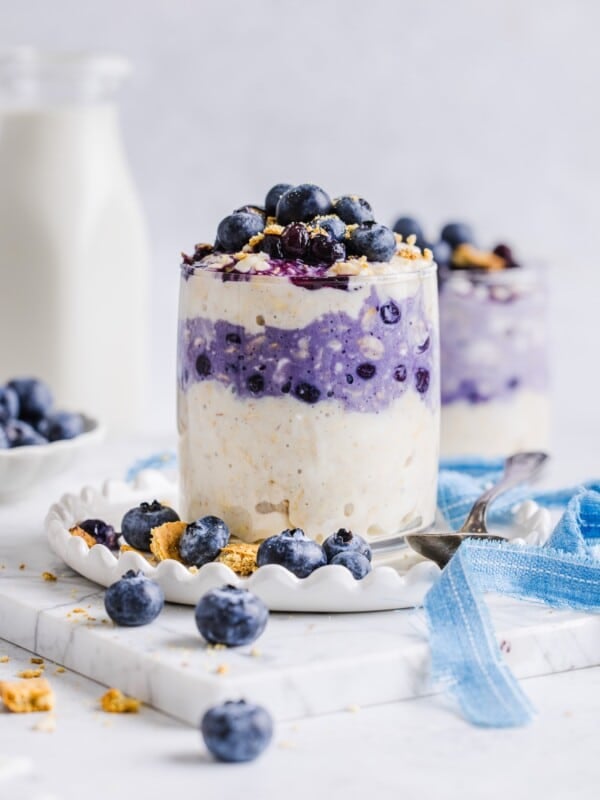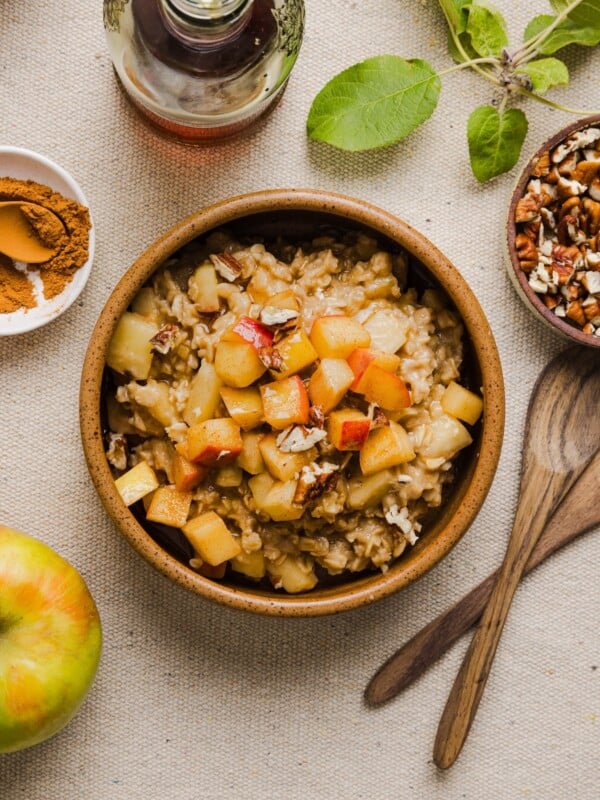Creamy, always fluffy, and never wet — this is the best recipe for cottage cheese eggs. It comes out perfectly every time and is such a simple, filling breakfast idea with 20g of protein per serving. You’ll also love my sheet pan eggs and Starbucks spinach, feta & egg white wrap.

Cottage cheese eggs are all the rage — but with the wrong technique, they turn out wet, rubbery, and not-so-fun to eat. My recipe for fool-proof cottage cheese scrambled eggs has been tested to ensure you get perfect results every time.
Read this blog (or scroll down for the full recipe) to learn how to perfect these high-protein scrambled eggs, tips to avoid common mistakes, and serving suggestions from a dietitian.
What Makes Cottage Cheese Eggs So Great?
- Packed with protein. Adding cottage cheese boosts the protein by 8 or more grams per serving, making these eggs more filling and balanced than your usual scramble.
- Fast and easy. This warm, satisfying breakfast comes together in just 10 minutes — perfect for busy mornings.
- Tested to perfection. I’ve made these eggs more times than I can count to nail the perfect method. The result? Scrambled eggs that are creamy, fluffy, and never rubbery.
Ingredient Notes
Scroll down to the recipe card for the full ingredients list and detailed recipe.

- Whole eggs: Whole eggs contain more fat than egg whites, so they’re better for creating a creamy and rich scrambled egg. I don’t recommend subbing in egg whites here.
- Butter: I like the flavor of butter best — just make sure to use a thin layer to keep your meal light. You can substitute cooking spray if preferred — olive oil spray or avocado oil spray are great options.
- Low-fat cottage cheese: I recommend 2% cottage cheese because it has the right balance of fat and protein for a nutritious meal and creamy texture. It’s especially important you don’t use fat-free cottage cheese, or your eggs may be rubbery and wet.
- Salt and pepper: For best results, season your eggs after they’re done cooking. Add extra seasonings or herbs like cayenne pepper or diced chives if desired.
Cottage cheese eggs are high-protein, low-carb, and gluten-free.
How to Make Cottage Cheese Eggs
Here’s a quick look at how to make scrambled eggs with cottage cheese:

Whisk eggs: Don’t leave any visible streaks of egg whites.

Add to your pan and scramble: Make sure your pan is heated to medium-low and coated with butter. Push your eggs around the pan.

Rest, scramble, and repeat: Cottage cheese has extra moisture that needs to evaporate. Repeat this cycle and give your eggs time to cook to perfection.

Remove from heat: When all the excess liquid has evaporated and your eggs look fluffly, remove them from the heat. Season and serve right away.
How Do I Know They’re Done Cooking?
- No excess liquid bubbling in the pan.
- Fluffy and pleasantly dry texture.
- Eggs and cottage cheese are clumped together and combined.
Helpful Tips
- Whisk the eggs thoroughly. Streaky eggs will impact the texture of your scrambled eggs, so whisk for a few minutes until totally smooth.
- Avoid fat-free cottage cheese. You need some fat for a soft and fluffy texture. Use 2% instead.
- Use medium-low heat. If your pan is too hot or too cold, you’ll end up with soggy or rubbery eggs. Pre-heat your pan to the perfect medium-low heat.
- Practice patience. Cottage cheese scrambled eggs take longer than normal to cook because you have to let excess moisture from the cottage cheese evaporate. If they’re looking watery or wet, keep cooking.
Need more healthy breakfast recipes? Try my protein McGriddle muffins or Starbucks-inspired bacon gruyere egg bites!
What Goes with Cottage Cheese Eggs?
- Fruit: Add up to 1 cup of fresh fruit for a source of carbs and fiber. For the most nutrition, choose a high-fiber fruit like berries, sliced apple, or pear.
- Avocado: Slice half an avocado for a boost of healthy fats and fiber. Season with salt, pepper, and red pepper flakes before serving.
- Whole grain bread: A great way to add fiber and carbohydrates. Look for options with “whole wheat flour” in the ingredients list, or at least 2 grams of fiber per slice. Serve 1–2 slices.
- Grated parmesan: A sprinkle of grated parmesan on top adds rich flavor and a small protein boost.
- Air fried potatoes: Toss diced potatoes with cooking spray and salt, then air fry for an easy, whole-food side. I usually cook for 12-14 minutes at 350 F.
- Oatmeal: A whole foods source of fiber and carbs that pairs well with eggs. Oats help round out your plate for a more balanced meal.
- Hot sauce and condiments: Add a drizzle of hot sauce, chili crisp, or ketchup for extra satisfaction.
- Sauteed greens: A quick sauté of spinach, kale, or chard in olive oil and garlic adds fiber and volume to your breakfast without much prep.
- Breakfast wrap: Turn your scrambled eggs into a filling wrap using a high-fiber tortilla with your favorite toppings.

Common Questions
Yes, you can double or triple this recipe — but make sure not to over-crowd your pan. Use a larger pan for bigger batches to ensure there’s enough room for excess moisture to cook off.
Yes, you can make cottage cheese scrambled eggs in advance, but they’re best served fresh. To store, keep them in a food container in the fridge for up to three days. Re-heat in the microwave for 30-60 seconds or until just heated through.
You can use high-fat cottage cheese, but I prefer this recipe made with 2% for a better balance of protein and fat. I do not recommend using non-fat cottage cheese, because they create a more watery and rubbery texture.
You just need more cooking time! Cottage cheese scrambled eggs take longer to cook than regular because cottage cheese has so much moisture. If they’re coming out rubbery, I suggest adding more rests between scrambles, and just cooking for longer overall. They’re done when they’re fluffy and pleasantly dry — the exact time this takes varies depending on your stove and pan.
More Easy Egg Recipes

Scrambled Eggs with Cottage Cheese
Equipment
Ingredients
- 2 large eggs
- butter, to coat pan
- ⅓ cup low-fat cottage cheese
- salt and pepper, to taste
Instructions
- In a small bowl, whisk eggs with a fork until smooth with no visible streaks of egg whites. Set aside.
- Heat a large non-stick pan to medium-low. Only once it's thoroughly heated, add a thin, even layer of butter or cooking spray. You'll know your pan is the right heat if your butter gently bubbles, but doesn't burn, when it hits the pan.
- Pour in eggs and cottage cheese. Use your spatula to gently combine the eggs and cottage cheese together. Then, continue to scramble by gently pushing your eggs around the pan and breaking them up as needed. Note: Cottage cheese contains excess moisture that needs to cook off. If you rush the process, your eggs will be watery, wet, and unpleasant to eat. So, every 5-10 seconds, pause your stirring – then, wait a few seconds as excess moisture from the cottage cheese bubbles and turns into steam. Stir again, and repeat this cycle until there is no excess moisture left, and your eggs look fluffy and pleasantly dry. This will take longer than regular scrambled eggs.
- When the eggs are finished cooking, remove your pan from the heat. Season with salt and pepper, and transfer to a plate. Add any additional toppings and enjoy!
Nutrition
Nutrition information is automatically calculated, so should only be used as an approximation.










I found this to be very good. I will make this again.
So glad you enjoyed, Martha! Thank you so much for your comment. 🙂